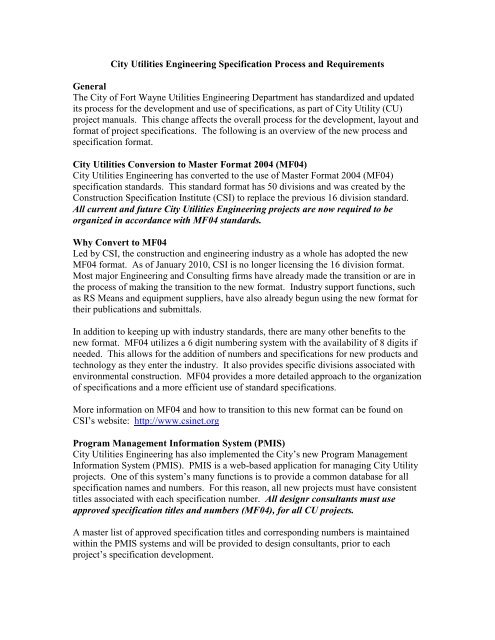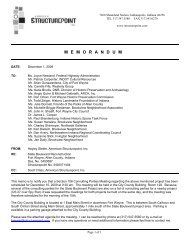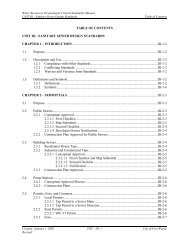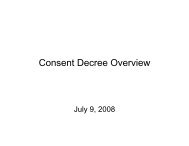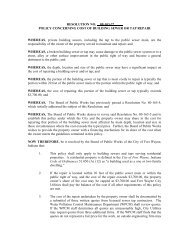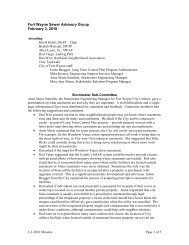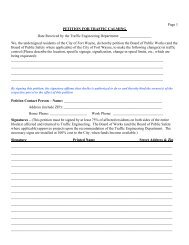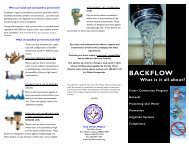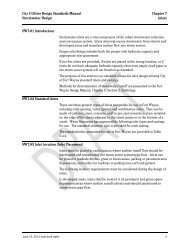City Utilities Engineering Specification Process ... - City of Fort Wayne
City Utilities Engineering Specification Process ... - City of Fort Wayne
City Utilities Engineering Specification Process ... - City of Fort Wayne
Create successful ePaper yourself
Turn your PDF publications into a flip-book with our unique Google optimized e-Paper software.
<strong>City</strong> <strong>Utilities</strong> <strong>Engineering</strong> <strong>Specification</strong> <strong>Process</strong> and Requirements<br />
General<br />
The <strong>City</strong> <strong>of</strong> <strong>Fort</strong> <strong>Wayne</strong> <strong>Utilities</strong> <strong>Engineering</strong> Department has standardized and updated<br />
its process for the development and use <strong>of</strong> specifications, as part <strong>of</strong> <strong>City</strong> Utility (CU)<br />
project manuals. This change affects the overall process for the development, layout and<br />
format <strong>of</strong> project specifications. The following is an overview <strong>of</strong> the new process and<br />
specification format.<br />
<strong>City</strong> <strong>Utilities</strong> Conversion to Master Format 2004 (MF04)<br />
<strong>City</strong> <strong>Utilities</strong> <strong>Engineering</strong> has converted to the use <strong>of</strong> Master Format 2004 (MF04)<br />
specification standards. This standard format has 50 divisions and was created by the<br />
Construction <strong>Specification</strong> Institute (CSI) to replace the previous 16 division standard.<br />
All current and future <strong>City</strong> <strong>Utilities</strong> <strong>Engineering</strong> projects are now required to be<br />
organized in accordance with MF04 standards.<br />
Why Convert to MF04<br />
Led by CSI, the construction and engineering industry as a whole has adopted the new<br />
MF04 format. As <strong>of</strong> January 2010, CSI is no longer licensing the 16 division format.<br />
Most major <strong>Engineering</strong> and Consulting firms have already made the transition or are in<br />
the process <strong>of</strong> making the transition to the new format. Industry support functions, such<br />
as RS Means and equipment suppliers, have also already begun using the new format for<br />
their publications and submittals.<br />
In addition to keeping up with industry standards, there are many other benefits to the<br />
new format. MF04 utilizes a 6 digit numbering system with the availability <strong>of</strong> 8 digits if<br />
needed. This allows for the addition <strong>of</strong> numbers and specifications for new products and<br />
technology as they enter the industry. It also provides specific divisions associated with<br />
environmental construction. MF04 provides a more detailed approach to the organization<br />
<strong>of</strong> specifications and a more efficient use <strong>of</strong> standard specifications.<br />
More information on MF04 and how to transition to this new format can be found on<br />
CSI’s website: http://www.csinet.org<br />
Program Management Information System (PMIS)<br />
<strong>City</strong> <strong>Utilities</strong> <strong>Engineering</strong> has also implemented the <strong>City</strong>’s new Program Management<br />
Information System (PMIS). PMIS is a web-based application for managing <strong>City</strong> Utility<br />
projects. One <strong>of</strong> this system’s many functions is to provide a common database for all<br />
specification names and numbers. For this reason, all new projects must have consistent<br />
titles associated with each specification number. All designr consultants must use<br />
approved specification titles and numbers (MF04), for all CU projects.<br />
A master list <strong>of</strong> approved specification titles and corresponding numbers is maintained<br />
within the PMIS systems and will be provided to design consultants, prior to each<br />
project’s specification development.
Master <strong>Specification</strong>s<br />
In addition the conversion to MF04 and the implementation <strong>of</strong> PMIS, CU has also<br />
developed Master <strong>Specification</strong>s. Master <strong>Specification</strong>s provide a basis for the<br />
specifications <strong>of</strong> commonly used materials and processes. Master <strong>Specification</strong>s<br />
standardize not only the specification titles and numbers, but also minimum material and<br />
performance requirements.<br />
CU Master <strong>Specification</strong>s do not limit the abilities or responsibility <strong>of</strong> the design<br />
consultant. They provide a basis for the minimum requirements <strong>of</strong> each material or<br />
process and must be edited to suit specific project requirements. CU Master<br />
<strong>Specification</strong>s are provided to the Design Consultant with Notes to Specifier (NTS),<br />
throughout the document. Each NTS identifies sections within the specification that must<br />
be reviewed and edited by the Designer.<br />
CU Master <strong>Specification</strong>s are not the same as standard specifications provided by<br />
industry organizations or s<strong>of</strong>tware, such as Spectext. CU Master <strong>Specification</strong>s have<br />
been written around the specific requirements <strong>of</strong> the <strong>City</strong> <strong>of</strong> <strong>Fort</strong> <strong>Wayne</strong>.<br />
There are currently over 35 available CU Master <strong>Specification</strong>s for use on CU projects.<br />
Available CU Master <strong>Specification</strong>s will be provided to design consultants, prior to each<br />
project’s specification development. Additional specifications, not covered by CU<br />
Master <strong>Specification</strong>s, are required to be developed by the design consultant, utilizing the<br />
MF04 formatting and naming convention.<br />
Project <strong>Specification</strong> Development <strong>Process</strong><br />
The following is a guide to the specification development process to be followed on CU<br />
projects. Additional information and available documents will be provided to the design<br />
consultant prior to each project’s specification development.<br />
1) Design consultants are responsible for the complete project design, including all<br />
specification content (including provided CU Master <strong>Specification</strong>s).<br />
2) Design consultants shall utilize CU Master <strong>Specification</strong>s, where applicable, and edit<br />
to suit project requirements. Project specific edits to Master <strong>Specification</strong>s shall be<br />
completed using tracked changes and provided to CU project manager for review and<br />
approval.<br />
3) Required project specifications not covered by CU Master <strong>Specification</strong>s shall be<br />
developed by the design consultants. Design consultants shall select specification<br />
numbers and titles from a CU Master list <strong>of</strong> all approved MF04 numbers and titles.<br />
4) If specification content does not match an existing title on the CU Master list <strong>of</strong><br />
names and numbers, design consultants shall use a CSI MF04 (latest addition)<br />
published title and number.<br />
5) If specification content does not match an existing title on the CSI MF04 (latest<br />
addition) published list, design consultants shall request a new number from the CU<br />
project manager.<br />
6) Design consultants shall submit a complete list <strong>of</strong> all specification titles and numbers<br />
to be utilized on a project. This list shall be reviewed and approved by CU project
manager during the design review process. Any titles or numbers added after the<br />
review is complete MUST be coordinated with the CU project manager.<br />
7) All new specification titles and numbers will be incorporated in the CU Master list for<br />
future use.


